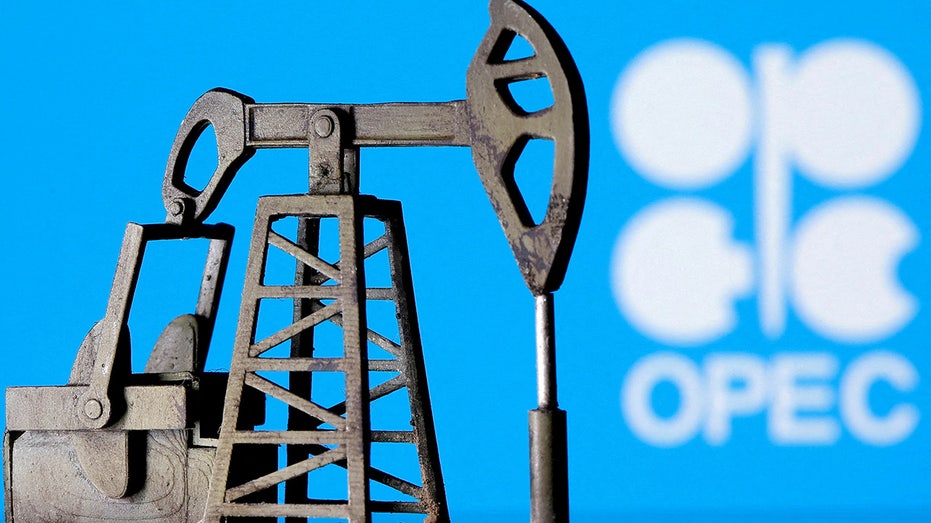Saudi Arabia defends OPEC+ oil cut decision as ‘purely economic’
Rising oil prices have been a key driver of inflation in the US and around the world
America’s relationship with Saudi Arabia must be ‘recalibrated’: John Kirby
National Security Strategic Communications Coordinator John Kirby discusses the Biden administration’s relationship with Saudi Arabia following OPEC’s decision to cut oil production.
Saudi Arabia is pushing back against accusations that OPEC+’s decision to cut oil production earlier this month was politically motivated against the United States.
The Kingdom’s Foreign Ministry said in a statement Thursday that the OPEC+ decision, announced on October 5, was "purely economic" and taken unanimously by all member states of the oil conglomerate.

FILE PHOTO: A 3D-printed oil pump jack is seen in front of the OPEC logo in this illustration picture, April 14, 2020. REUTERS/Dado Ruvic/File Photo (REUTERS/Dado Ruvic/File Photo / Reuters Photos)
"These outcomes are based purely on economic considerations that take into account maintaining balance of supply and demand in the oil markets, as well as aim to limit volatility that does not serve the interests of consumers and producers, as has been always the case within OPEC +," the Foreign Ministry said.
It added that the Biden administration’s request to postpone the OPEC+ decision for a month – in other words, helping reduce the risk of a spike in gas prices ahead of the November midterms – "would have had negative economic consequences."
The White House pushed back on Thursday, rejecting the idea that the requested delay was related to the U.S. elections and instead linking it to economic considerations and Russia's war on Ukraine.
"We presented Saudi Arabia with analysis to show that there was no market basis to cut production targets, and that they could easily wait for the next OPEC meeting to see how things developed," said John Kirby, coordinator for strategic communications at the National Security Council.
STATE DEPARTMENT BEGINS TO DECIDE ON ‘CONSEQUENCES’ FOR SAUDI ARABIA
The Foreign Ministry criticized President Biden for suggesting that Saudi Arabia had effectively sided with Russia in its war against Ukraine with the OPEC+ decision.
"[A]ny attempts to distort the facts about the Kingdom’s position regarding the crisis in Ukraine are unfortunate, and will not change the Kingdom’s principled position, including its vote to support UN resolutions regarding the Russian-Ukrainian crisis," the Foreign Ministry said.
It added that while Saudi Arabia "strives to preserve the strength of its relations with all friendly countries, it affirms its rejection of any dictates, actions, or efforts, to distort its noble objectives to protect the global economy from oil market volatility."

FILE: People and media gather at the entrance of the building of the Organization of the Petroleum Exporting Countries, OPEC, in Vienna, Austria on Oct. 5, 2022. (AP Photo/Philipp-Moritz Jenne / AP Newsroom)
Rising oil prices — and by extension higher gasoline prices — have been a key driver of inflation in the U.S. and around the world, worsening global economic woes as Russia's months-long war on Ukraine also has disrupted global food supplies. For Biden, gasoline prices creeping up could affect voters. He and many lawmakers have warned that America's longtime security-based relationship with the kingdom could be reconsidered.
EUROPE TURNS TO AFRICA IN BID TO REPLACE RUSSIAN NATURAL GAS
On Tuesday, Biden warned of repercussions for Saudi Arabia over the OPEC+ decision.
"There's going to be some consequences for what they've done, with Russia," Biden said. "I'm not going to get into what I'd consider and what I have in mind. But there will be — there will be consequences."
GET FOX BUSINESS ON THE GO BY CLICKING HERE
Biden, who famously called Saudi Arabia a "pariah" during his 2020 election campaign, traveled to the kingdom in July and fist-bumped Prince Mohammed before a meeting. Despite the outreach, the kingdom has been supportive of keeping oil prices high in order to fund Prince Mohammed's aspirations, including his planned $500 billion futuristic desert city project called Neom.
The Associated Press contributed to this report.





















